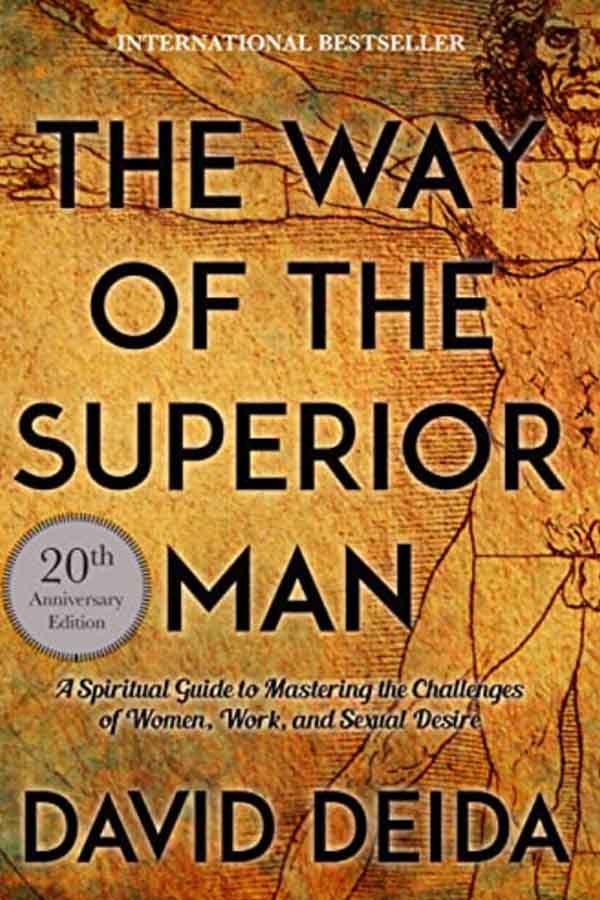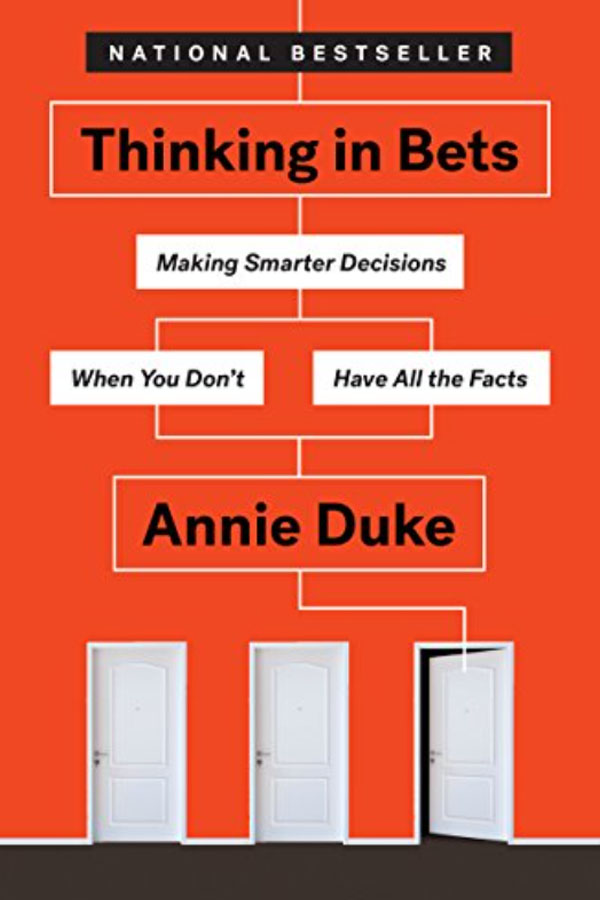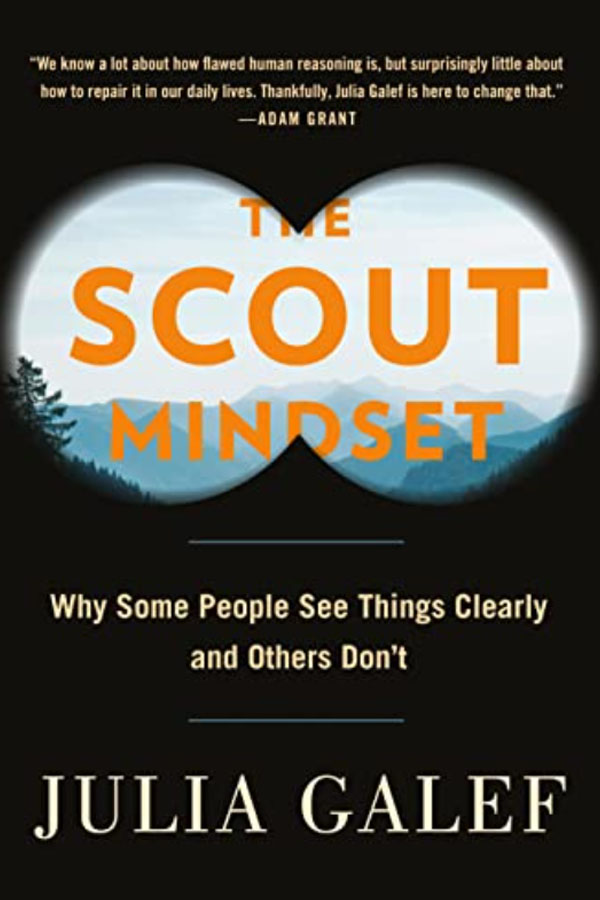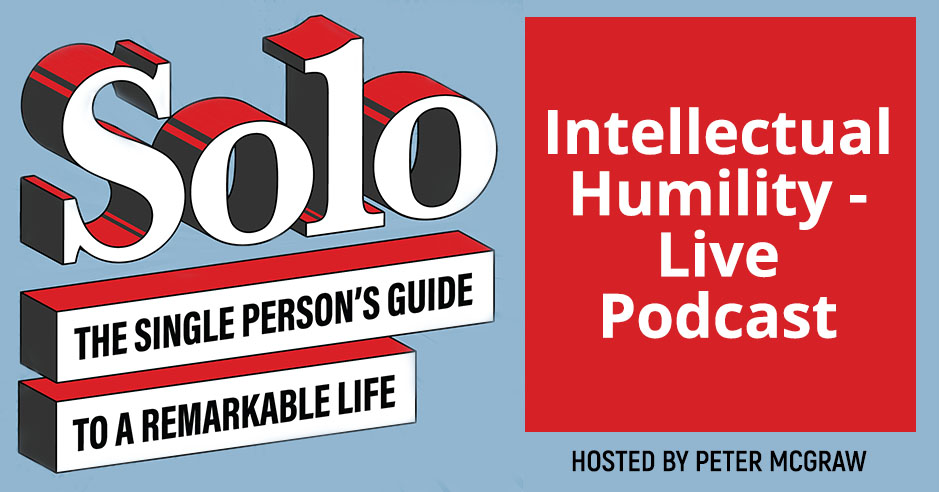Peter McGraw recently attended the Mind Under Matter Festival, where he did a live taping about Intellectual Arrogance, Humility, and Timidity with Dr. Jeff Larsen. Dr. Larsen is a Social Professor of Psychology at the University of Tennessee Knoxville. He is an expert on emotions, attitudes, and well-being.
—
Listen to Episode #144 here
Intellectual Humility – Live Podcast
I attended the Mind Under Matter Festival, a science and music festival hosted by my friend Shane Mauss. While there, I taped three SOLO episodes, the Narcissism episode, which has already been launched, the forthcoming Truth Or Truth episode with Suzette Smith, and this one, a live conversation about intellectual arrogance, humility, and timidity with Jeff Larsen. He is a Social Psychology Professor at The University of Tennessee, Knoxville. He’s an expert on emotions, attitudes, and well-being.
He has conducted the leading research on mixed emotions and ambivalence. He’s also a friend, co-author, and former roommate from graduate school. Jeff is built for academia. This is evident from this conversation where he shows how deeply he has thought about the perplexing problem of why we are wrong about many things so often. I hope you enjoy the episode. Let’s get started.
—
Welcome, Jeff.
Thanks, Pete.
The show has two types of episodes which are profiling remarkable solos and engaging in topics that help readers live a more remarkable life. This episode is the latter. We’re here to talk about intellectual arrogance. Before we get into this, we need to address a phrase that you’ve used with me, and that is, “Bias is for other people.” Why do we want to talk about that first?
The phrase here is, “I’m okay you are biased.” As social psychologists, one of the main things that we study, as well as judgment decision-making, should be called misjudgment and bad decision-making. Because we all make them, except in our own minds, you make them and not me. A big part of social psychology is demonstrating that this is the average person who makes these errors.
It’s very tempting to say, “I’m not the average person. I’m above average,” but that’s yet another error. Most of us think we’re above average. In my undergraduate classes, one of my main messages has always been, “It’s us.” I try to avoid the word you when talking about these things. I try to use the word we and make the case of, “It’s not your Uncle Bob at Thanksgiving who’s biased about everything. It’s all of us.”
A takeaway from this is this idea around intellectual arrogance. It’s very difficult to affect another person’s arrogance, but it’s possible to affect your own. To start from this point of, “This may be a problem for me.” You couple that with, “The only person you can change is yourself.” It becomes quite important to do this. We also need to talk about naïve realism.
It is the sense that we all have that we see the world as it is. The word naïve usually means something different. It means childish or what have you. That’s not what we mean here. It’s this view that the average person on the street has and that we see the world as it is. The history of psychology is about demonstrating that that’s not the way it is. We don’t see the world as it is. Different people see it differently. Even when everybody sees it the same way, they probably aren’t seeing it the way that it is.
What’s a compelling example?
The most compelling example is the one that gets everybody angry, which is the dress, whatever color you see it as that the sense that we have is not. I see it as white and gold. Instead, the sense we have is it is white and gold. Seventy percent of people out there are saying, “It’s not. It’s black and blue.” In a sense, we seem to see it differently, but we all have the same illusion in the sense that all of us, no matter how we see it, think that it is the way we see it rather than, “That’s simply the way I see it.”
How did you get into this topic? Why is studying intellectual arrogance important to you?
It does go back to the semester-long argument that I’ve always tried to make in my Social Psychology class. All of us have this intellectual arrogance, which if we wanted to find it very simply, we could say, “It’s being a know-it-all,” and to have that message. That’s one way. Another way is my training that the best way to see your own intellectual arrogance is to go through a PhD program.
At every turn, people are pointing out that your ideas are wrong. This brings up our personal history. Peter and I, in graduate school, started a long collaboration looking at questions about mixed emotions and particular questions about whether people can feel happy and sad at the same time. We did some studies and they were neat studies. Some of them were already in the press and then I go into my dissertation defense. I was up here because I thought I’d saw what we but not that.
This man is the driver. I’m a co-pilot on this work. He’s being modest because the first paper that we published on it, for me, is my most cited paper. It is in the flagship Social Psychology Journal and it sailed in.
I sailed into my dissertation defense a few months later. This question had gone back to Plato. I’ve answered 2500-year-old questions. This is great. I asked Philip Tetlock to be on my committee because he is smart. It was an extra member. I didn’t even need him on the committee. My day would’ve been a lot better. He went and poked holes in all the studies and I had no answer. I passed and everything, but it was very deflating. It took ten years. We published that paper in 2001. In 2011, I went to a conference and I said, “Here, Phil,” with another paper in that we had addressed all his alternative interpretations. That day was a pretty pivotal day.
You’re working on a book that in particular tackles this topic. Why is this an important topic for everybody but you?
The book is about the power of belief and how wrong we are in just about everything. The problem is that beliefs matter. A science writer said, “Belief is responsible for most of the misery in human history,” which might be a bit of an overstatement. Nonetheless, look at all the ways in which human wrongness has contributed to suffering and death genocide. It’s important for people to try to get things right. To do that, it starts with a recognition that, “I might be wrong.”
It’s fair to say that intellectual arrogance or being a know-it-all is not the norm. It’s like overwhelming, It’s common that we often don’t even realize that we operate from that perspective.
It’s easy to say, “That guy is a know-it-all.” We’re all know-it-alls, which would be fine if we did know it all. The more we think we know, probably the more likely it is that we’re showing this intellectual arrogance. We could look at the history of psychology and see many ways in which people are wrong and overconfident.

A great example is an impossible knowledge where you can give people a list of items and ask them, “How much do you know about these things?” Historical events, historical figures, and novels. You might give them things like King Henry IV. You also include Queen Shaddock and novels like Murphy’s Last Ride. You could include Prince Peter McGraw, and about 20% of people said, “I know about that guy.”
When you include these things that don’t exist, about 20% of people say, “I know something about that.” The most horrifying example is that in around 2013 as someone did a study that revealed that 20% of Americans were in support of bombing the Middle Eastern Kingdom of Acaba, which is the kingdom from Aladdin. That’s scary.
You could have answered Twitter and we would’ve all understood in this way. Having this know-it-all perspective and arrogance, not only is it causing human misery. We have the sale of which trials and beyond with things like this, but it also makes life unpleasant. The sense of reading your work suggests to me that this is not a cold experience and intellectual arrogance is hot. It’s impolite oftentimes. It creates conflict.
Behind every human disagreement is that sense of naïve realism. If I prefer chocolate ice cream and you prefer vanilla ice cream, there’s no disagreement there. You’re not going to say, “Jeff, you like vanilla.” You’re going to say, “I like vanilla. You like chocolate. There’s no disagreement.” As soon as we replace, “This is the way I see it,” with, “This is the way it is,” that’s where the disagreement is. It’s easy to see that intellectual arrogance at play when two people are arguing over each other.
The more challenging intellectual arrogance to see is when we are all by ourselves and thinking on our own or even more when we’re in a like-minded group of people, everybody agrees with us. If we all agree on the wrong thing, that fans the flames of our intellectual arrogance giving us this confidence that we’re right. We only get that sense because you have selectively chosen to hang out with the people that agree with us.
I received a text message from a good friend and a contributor to the SOLO Project. She’s in Santa Fe at a wedding with her family and with close friends. I have a very dear friend that is getting married. She’s very supportive of this marriage and she’s having a good time. She sent me this text message that said, “I feel unloved. I recognize that I have a lot of love in my life, but everyone around me is pitying me for being single. My mom is trying to set me up with people.” What she doesn’t understand is, while I may, at some point, welcome this, I’m not interested in it and I’m certainly not interested in that. This is exacerbated because everybody at this wedding is pro-matrimony.
Many of them are coupled up. They’re seeking to ride the relationship escalator. There was, for her, luckily one other person who wanted to go out and rage afterward while all the partnered people went home at 10:00. How difficult that is when you are that one person who doesn’t belong or you don’t share that common belief. It’s amplified because we’ve invented this ceremony that is celebratory and people commit much to support this. People flew in from all over the country to Santa Fe to support this couple in this endeavor and how difficult it would be for her to have a logical conversation around, “This is my vanilla ice cream,” versus, “This is the way you ought to live.”
When we have beliefs, sometimes we have reasons and rationalizations for our beliefs. If the reason comes first and then the belief falls out, that’s the reason but sometimes we’ve arrived at a belief for whatever reason. After the fact, we come along and come up with rationalizations for it. Our own rationalizations never seem like rationalizations do. They always seem like reasons.
That’s the tail wagging the dog. I’ll give you my perspective on this. The pressure that she feels comes from 1 of 2 places. One is genuine concern for her well-being and this belief that getting married and finding a lifelong partner or a soulmate will make you happy is better than not in a sense. It’s naïvely ignoring the potential risks of that pursuit that you might not find your soulmate or you might find someone who’s not very good for you. The other one is this idea of like, “Doing this thing, a relationship, is difficult.” Even a good relationship finds moments of friction, tension, challenge, and so on.
When it is mandatory or something that you ought to do that’s the best path, it becomes easier to walk that difficult path. Sometimes that proud single person suggests to you, “I don’t have to do this.” This makes that path a little bit difficult. When most people pity a single person, they’re doing it because they truly believe that they’re on a better path. Other times it’s like, “I’m on a better path. I swear I know I’m on a better path.” If you agree that it’s a better path, then I can feel better about that.
The social proof that, as soon as we hold a belief or engage in some action, if we see other people who have made a different choice and hold a different belief, that raises the possibility that we’re wrong. If we can pull them over to our side, then we kill two birds with one stone. We have a bigger group and less evidence that we’re wrong.
The challenge is to get someone to say, “I’m wrong.” To forego their arrogance is to say, “I don’t know everything,” and to exhibit intellectual humility. To be able to entertain the fact that one is wrong, to be convinced through fact, logic, and reason. We shouldn’t stone young women because they think they’re witches or whatever it might be. How does one do that? How does one develop humility when it’s clearly very not in our natural psychological tendency?
However hard it is to develop it in ourselves, it’s impossible to get somebody else to be intellectually humble. It is much more about what’s going on in here in your own mind than it is about your Uncle Bob at Thanksgiving. That first step of saying, “I might be wrong,” in and of itself, is a challenging one. One approach is to surround yourself with a community where people are going to be honest with each other and where it’s explicitly on the agenda that we’re going to point out to each other when we think the other is wrong. That has to be a ground rule because if someone comes up to you and says, “You’re wrong,” you’re not going to going to respond well even when you are in one of those communities. When a scientific community is functioning effectively, that’s one of these cases, but even then, it is painful.
If you’re not familiar with academic publishing, essentially what you do is work for a long time, sometimes years on a paper. You make it into the most exquisite thing that you can. We used to put it in the mail. Now, luckily you upload it and an editor reads it. Sometimes the editor reads it and goes, “This is shy,” and sends it back to you and says, “Don’t bother here.” Fortunately, that’s been a rarity in our world, but the gauntlets getting started at that point. That editor usually sends it to 2 to 4 people to read and those people critique it. These are smart, motivated people who are trained to be very critical.
Those reviews come back and if they’re favorable, you can be happy because you can see a path to publishing this paper but there’s still some resentment that’s there. Sometimes the best begrudging sense of like, “They are right in this way.” The very best scientists embrace and welcome those critiques and use them to better shape the next round. It then rinse and repeat and sometimes 1, 2, or 3 more times depending on the quality of the paper, the nature of the editor, and the domain that you work in.
It starts earlier than that. A social psychologist named Kevin Dunbar embedded himself in different chemistry and big labs, with lots of graduate students, and post-docs, and tried to analyze the way the process works. What happens is at that very first lab meeting, a graduate student or a post-doc comes in. They’ve got this great idea and they can’t see the flaws because their humans.
From the get-go in that lab meeting, other people are finding the flaws. It’s not an environment for everybody. People work their way out of the system because it’s not always a pleasant system, but that’s the rule. Something you said reminded me of Daniel Kahneman’s Nobel Laureate in Economics despite being a psychologist. He got it the year after I worked with him. I think that there’s at least a chance.

I arrived on campus and within a week he had a Nobel Prize.
He’s got this amazing twinkle in his eye. He said something about he feels this sense of wonder and movement when he finds out some way in which you were wrong. I can totally feel that but also, as someone who’s having been heard from him and how I’ve been wrong, I didn’t have that same sense.
He’s among the top behavioral scientists ever in terms of a broad array of findings, but then also, making its way into policy, business, and the minds of regular smart people. In science, there are 1 of 2 errors that you can make. This is not just in science. This is anytime you make an argument. You can commit type one error, which is to say something is true and it is false. The other one is to essentially do the reverse of that. You can’t minimize both of those errors. You have to choose one or the other. Scientists tend to make lots of type one errors. We have a replication crisis, for example, and lots of papers out there that say that X is present when it’s not present that’s there.
We’re taught to make arguments, show this and overcome the critiques of these people, some of which you might not respect that’s there. Danny makes almost no type one error. He has a couple of papers that are wrong and that he’s like, “I was wrong about this,” and he says it explicitly. He makes so much type two errors because he has much humility about how he approaches things that he’s not willing to put an idea out unless he’s 100% on it. It’s a rarity and it’s why he is well-respected.
Right after I got there, Norbert Schwarz happened to be in town, another social psychologist. We all spent a day together. A few days later, Norbert said, “Whatever you do, don’t let Danny stop you. He’ll want everything to be perfect. He’ll worry about this and that. It’ll stop you in your tracks.” The problem is that’s the way I am as well. It wasn’t a great conversation. If he didn’t have the worry, I’d have the worry and nothing came out of it. It might take teamwork.
The last thing about this is Jeff and I have published a number of papers together, only one with Danny, and it took nine years to get done. How does one achieve humility for one’s self, given you can’t elicit it very well in others?
The one thing is to say that all too often, this intellectual humility requires standing up to your own beliefs and asking, “How might I be wrong?” It’s tough to do it on your own because if you were aware of that way that, “I might be wrong,” then you wouldn’t believe that way to begin with. One of the challenges for me is when it comes to doing my research, I tend to be pretty epistemically humble. We are rewarded for this and always thinking, “What’s the next alternative interpretation coming up with it?” As a scientist, I do pretty well being epistemically and intellectually humble. As I was driving over, it was six hours.
On three occasions, I flipped off a bumper sticker. Who does that? When I’m not in my lab and I’m living my life and I’m devoting decisions and all the rest, I’m as epistemically arrogant as the next person. One reason is because I don’t have anybody that I talk about politics with except for the people that I agree with. There are options. I’ve got plenty of family members that I could talk about politics with that we don’t see eye-to-eye but I don’t do it. Seek out those people.
This is a friendly PSA. If you agree with every single thing that your party puts forth, it’s probably worth thinking about, “Is there one thing that you disagree with?” There’s a book called The Way of the Superior Man. It’s an interesting book about masculinity and femininity. I’m not recommending it per se, but there’s a short chapter in there in which the author says, “Invite the criticisms of your friends.” Friedrich Nietzsche talked about the value of friends and how important friends were in terms of making your life more remarkable. What friends have for you is they have affection. They care about you. They want you anti-jealous.
They want you to succeed. They also know stuff about you. They have insights about you, observe your behavior, and have conversations with you, but they’re also distant enough from you to be able to often see things better than you can see them yourself. One of the things that I have always tried to do and originally it came from a lack of confidence is I have a saying of, “I like to give advice. I like to take advice.” I find myself constantly taking advice, asking people who I know, “What do you think I should do in this scenario? What do you think the best path is in that way?” I find that to be a very useful thing, which is like, “These are people who care about me. They’re not afraid of insulting me. We’re not going to fight about something,” but seeking that input in a sense.
Note how much this does bump up against a lot of standard operating procedures among humans. Usually, we don’t want people to tell us the truth. Those truths are unpleasant. You are a bit of an outlier on this one. You’ve given me hard truths on occasion over the years, and it’s been painful. That’s your way of being a good friend. I think a lot of other friends don’t take that same tack because there are emotions involved. We need to be able to learn from other people, but oftentimes, other people don’t want to give us the truth.
This is an act of vulnerability to say to someone that you care about, “I want you to tell me unpopular things about myself.”
Poker champion, Annie Duke, wrote an excellent book a couple of years ago called Thinking In Bets. She doesn’t play poker anymore, but when she did, she had a poker club and they were all fellow poker players, including her brother. Their goal was to be honest with each other and say, “Here’s how I handled this situation. What should I have done?” The rule was you could only bring something to the table if you were willing to get that unvarnished feedback. There does have to be that understanding from the get-go and establishing that understanding. Sticking to it is pretty tough.
I’m a big believer in honesty. I think it’s a dominating strategy, especially if you want to build a strong foundation professionally and personally with friends, lovers, family, etc. I do believe that there is diplomacy and politeness. Oftentimes, what people end up saying is, “I’m brutally honest.” I’m like, “That’s code for I’m me versus I’m compassionately honest.” It is a much nicer way.
The one thing that’s always very nice about honesty is you go, “I’m not always going to be happy with what you end up saying but I can trust you.” That becomes a better foundation and how do you invite that level of honesty, which is, “I want you to be honest with me, but I want you to be sensitive to the fact that I might be disappointed or disagree with what you end up having to say.”
We’ve been talking about the social aspect of it. I also want to put in a plug for a book by a woman named Julia Galef called The Scout Mindset. She distinguishes between the scout mindset and the warrior mindset. Both of these ways of thinking are effortful. We’re thinking hard. Usually, if I’m thinking hard, I must be thinking well, but that’s not how it works because oftentimes, we are not thinking carefully in order to get to the truth.
Instead, we’re thinking carefully to get to where we want to be and hold onto the belief and the preconception that we already had. When we’re in that mode, we’re in a warrior mindset. Psychologists call this motivated reasoning or biased reasoning. Scout mindset is when we’re looking for the truth. Those terms are perfect to capture a lot of social psychology research on these topics over the past couple of decades.

A risk of pursuing intellectual humility is this notion that you go too far in the other direction.
If this intellectual arrogance is knowing it all and if intellectual humility is the opposite of intellectual arrogance, that means that to be intellectually humble, what I need to do is know nothing. The risk here is that if you take it to its extreme, you no longer know whether 1 plus 1 equals 2. My sense is that we confuse intellectual humility with intellectual timidity. There’s a happy medium there somewhere where intellectual humility lies somewhere between these two vices.
These are two opposites, knowing nothing and knowing everything.
These are two of the vices that either end. This goes back to Aristotle’s ideas about virtue ethics. For him, all virtues represent a virtuous mean between two opposing vices.
I can see this as someone who is intellectually timid is also not good company.
You’d know because you’ve had my company.
How do you navigate this? It doesn’t sound to me that thinking that you know nothing comes naturally to people, but you could sway too far if you’re committed to this idea.
Sometimes, that ends up being this laziness that this idea of all of us coming to the truth does take us working together. We can’t do it on our own and in order to avoid conflict and whatnot, we end up saying, “That’s your opinion.” It doesn’t work when it comes to things like climate change and all the litany of things that I could list.
Thankfully, we didn’t do that with hand washing.
All this is to say is that I think that we do veer into that intellectual timidity too often. We veer into intellectual arrogance even more often and finding that happy medium is definitely not an easy thing to do. Humility doesn’t seem like there’s any courage involved there. It does require the courage to say, “I’m wrong about everything but we can get some things right.” In the history of science, we know that Earth isn’t flat. It’s about that courage to figure out how we’re wrong, what we can get right, and how to do it together.
This notion of vulnerability has been something that keeps coming up. I did an episode about Getting Stood Up and what I learned from getting stood up. One of the things that happened during the SOLO Project for me is any time that I am vulnerable when I talk about my failings, being scared and the challenges that I have is when I get the most positive response from people. In some ways, for the average person, that’s counterintuitive because you’re like, “I’m supposed to know all because I have all the answers. I’m supposed to be good at being single because I’m the guy. I’m the host. I’m the one who people are looking to.”
Most times, when I go, “I’m struggling with this. I’m not good at this. I’m having trouble with this.” Brené Brown talks about being vulnerable is to be brave. I use this term courageous especially as a man who is counterintuitive because you think of bravery as these physical things. It’s putting yourself in harm’s way and so on versus allowing yourself to be emotionally humble and be able to say, “I feel weak.” There’s this notion of saying, “I don’t know. I’m unsure,” is an act of vulnerability. For me, a friendly reminder is that it’s okay for me not to have all the answers. It’s best for me to be able to say, “I can’t do that for you. I think you need to look elsewhere to be able to solve that problem.” In part because then it restores confidence in me when I do say, “I know this one.”
That’s probably a good place to end with that notion of courageousness or vulnerability and to allow yourself to say, “I don’t know. I’m unsure. Let me get back to you,” or even, “What do you think that I have a chance to learn from you in that sense?” I’m sitting next to a man who I have learned a lot from professionally and personally. I think we were good partners as researchers starting, especially as graduate students where you reminded us how little we did know. We did figure something out to recognize that, “How can we communicate this well for people who might disagree or who might want to know this?” It’s been very nice. Thank you much, Jeff.
Thanks for having me. It’s been great.
Important Links
- Narcissism – Past Episode
- Jeff Larsen
- The Way of the Superior Man
- Thinking In Bets
- The Scout Mindset
- Getting Stood Up – Past Episode
- Http://AffectAnDemotionLab.weebly.com/
About Jeff Larsen

